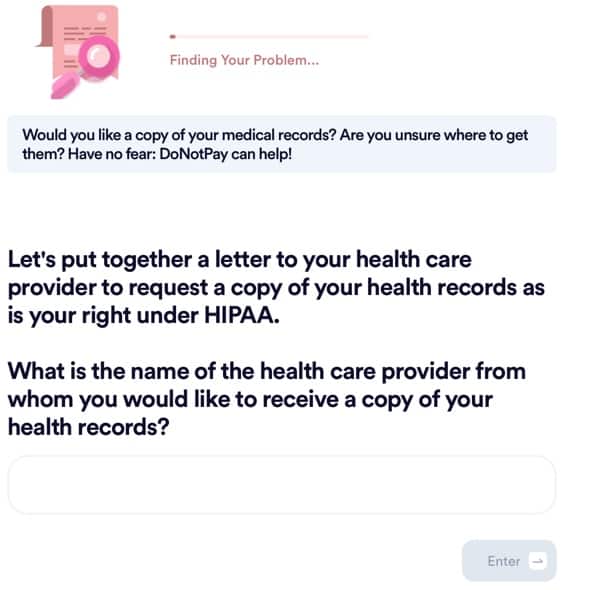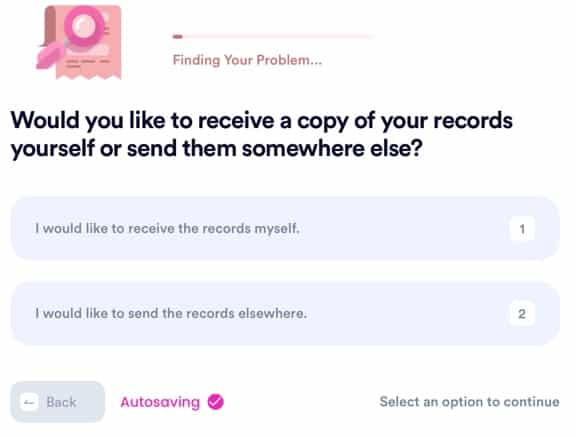Where Do I Get My Temple Medical Records?
Acquiring your own should be an easy and uncomplicated procedure, it isn't always, however. There are a few common reasons patients have so much trouble accessing their own information but there are a few that happen over and over again. They include:
- Unclear security procedures
- Poor IT interoperability
- Unused Internet patient portals
Interoperability is imperative for patients to retrieve their medical records. Interoperability is a term used to describe the way computers exchange information and work with each other and different operating systems. These systems are in place all across the country and must be able to gracefully exchange information for patients to access with minimal issues.
Hazy security protocols are the most irritating of all stops to a patient's records. They are illogical and often unexplainable even by the people who enforce them. Typically outdated, obscure artifacts of past systems, DoNotPay has done away with many of these requirements to help anyone gain entry to their records.
Underused patient portals are a big reason people can't find their healthcare records. This is commonly caused by a misunderstanding of the Internet. Many patients aren't outfitted to access the Internet or their portals or they don't understand how to use it. These types of patients are usually in search of paper copies of their medical records.
Getting your medical records from somewhere as respected as Temple should be much simpler, but, of course, it usually isn't. Mercifully, DoNotPay has an easy way to thwart all the problems in the world of healthcare administration.
HIPAA and Your Right to Access Health Information
The Health Insurance Portability and Accountability Act, or HIPPA, made it a crime against federal law in 1999 to share sensitive patient information without that patient's consent. These laws comprise a series of supervisory standards that set the lawful use and publication of PHI, or protected health info. Compliance with HIPAA is regulated by the Health and Human Services Department.
HIPPA laws expressly outline the right of patients to access their medical records with mandate 45 CFR § 164.524, but there is still a slew of concerns, such as clinics charging patients to access their personal records, which make it almost impossible to collect the documentation necessary.
Why Would Someone Need Copies of Their Medical Records?
American citizens have a right to obtain copies of their medical records, no matter where they were medically treated. There are all sorts of valid reasons someone may need their records, including:
- Compilation of family medical history
- Relocating to another state
- Unhappy with current physician
No matter what the reason may be, it's your right to acquire these documents. DoNotPay has a proven system to help patients get their medical records when problems occur. No one should be kept in the dark about what their own health records report.
What Types of Medical Records are Restricted from Release?
In some circumstances, HIPAA calls for certain data to be redacted from medical records before it is released from the facility. This is specifically true when it comes to dealing with anything that relates to a third party or that could bring considerable detriment to anyone involved if disclosed, such as:
- Sexually transmitted diseases
- Mental illnesses
- Drug and alcohol treatments
Nothing is typically redacted when speaking of a person's own records unless there is no distinction made within the company about who is requesting the records.
How to Request Medical Records from Temple University Yourself
offers a fairly easy way to get your medical records online. Their website provides several phone numbers to call to access your records, depending on which section of Temple you were treated in.
Current and former patients of Temple University Hospital, as well as the Episcopal and Northeastern campuses, who need to request a copy of their medical records, should contact Health Information Management:
| Phone | 215-707-3755 |
| Contact Form | https://www.templehealth.org/contact-us |
| Hours | 8:00 AM to 10:00 PM, every day |
How to Request Medical Records Using DoNotPay?
DoNotPay has been asked for many years to help people get the medical records that they've been denied. We know how to write your health care provider a simple, clear, and effective letter that will get your legally guaranteed health records for you in no time.
- Look up medical records on DoNotPay's website.

- Enter the name of the health care provider you'd like to receive medical records from.

- Answer a few questions about your provider and where you'd like to send the records.

DoNotPay Works Across all Entities
It's definitely fortuitous that DoNotPay can help get you the medical records being denied, but there's even more good news. DoNotPay works for just about any problem you may have, from speeding tickets to overcharges on your cable bill. DoNotPay is the go-to for all things consumer-related.
Don't hesitate to check us out when you need a friend in your corner. We're here to help!
 By
By